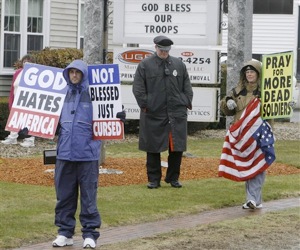-
- New York couples who wed in Massachusetts celebrate same-sex marriage ruling
- Two gay U.S. bishops not invited to major conference of Anglican prelates
- ETHA advances in Congress, abstinence does not
- Protests by an anti-gay group near funeral may lead to demonstration ban
- Kent State joins trend of providing gender neutral restrooms
- Yolanda King dies
- National News Briefs
- World News Briefs
national
Protests by an anti-gay group near funeral may lead to demonstration ban
At least 32 states have enacted laws restricting funeral protests
Published Thursday, 24-May-2007 in issue 1013
CONCORD, N.H. (AP) – Protests by an anti-gay group near the funeral of Army Capt. Jonathan Grassbaugh in Hampstead last month have inspired a last-minute effort to ban demonstrations near funerals.
The ban was added as an amendment to an unrelated bill, establishing a New Hampshire Medal of Honor that is working its way through the Legislature.
It’s similar to a national law passed last year that requires demonstrators to remain at least 500 feet away from mourners in national cemeteries.
Last week, Gov. John Baldacci signed a Maine version.
Several members of the Kansas-based Westboro Baptist Church picketed in the center of Hampstead, down the road from St. Anne’s Catholic Church, where Grassbaugh’s funeral Mass was held April 18.
The group, which says the deaths of American soldiers in Iraq are God’s punishment for tolerating homosexuality, often greets funeral-goers with signs and taunts.
A retired Marine from Massachusetts, Frank Downs Jr., stood in front of the demonstrators with a large American flag, inspiring others to join his counter-protest. The Patriot Guard Riders, a group of motorcyclists that aims to shield military funeral processions from protestors and honor the dead, also sent a contingent to Grassbaugh’s funeral.
Sen. Robert Letourneau, R-Derry, the sponsor of the Medal of Honor bill, also attended.
“When I turned the corner and saw those protesters, I was sick to my stomach,” he said. “Here’s a kid that was one of New Hampshire’s finest.”
At least 32 states have enacted laws restricting funeral protests, according to the National Conference of State Legislatures.
They include the church’s home state of Kansas, where the governor signed a bill last month saying protesters cannot be within 150 feet of a funeral one hour before, during or two hours after the end of the service. Violators would face up to a $1,000 fine and six months in jail. It also makes it illegal to obstruct any public street or sidewalk and allows family members to sue if they feel protesters defamed the deceased.
Members of the Westboro Baptist Church said the law would not affect them, as they always remain at least 300 feet away.
New Hampshire’s proposal would bar protests within a mile of any funeral, based on a federal court ruling that said such bans are constitutional as long as they apply to all funerals, military and civilian.
However, some New Hampshire lawmakers were uneasy with the last-minute amendment process.
Rep. Eleanor Glynn Kjellman, D-Henniker, who served as an Air Force protocol officer in Japan during the Vietnam War and has two sons in the military, said the measure raises First Amendment questions of free speech and should get a public hearing to make sure it will withstand a legal challenge.
“These people are so despicable, I would love to be able to do something to limit them,” she said. “But I’m concerned when we do that, that we make sure it’s really bulletproof, that it can survive any challenge.”
Rather than face a floor fight, the House committee that added the amendment voted to reconsider it and hold a public hearing, scheduled for Thursday.
Last week, legislation prompted by anti-gay demonstrations at soldiers’ funerals received final approval in the Maine Legislature.
The bill sponsored by Sen. David Hastings III, R-Fryeburg, makes it a crime to accost, insult, taunt or challenge any person attending a funeral, burial or memorial service.
Hastings said he was prompted to introduce the bill after members of the Westboro church threatened to show up at the funeral in March for a soldier from his district, Army Sgt. Corey Dan of Norway, who died in Iraq. The protesters never showed.
Hastings said he was also moved to introduce the bill in memory of a brother whose plane was shot down in the closing days of the Vietnam War, “at a time when [war] protests were at their height.”
His original bill sought specific restrictions on activities by protesters, including time limits, but they were removed. The amended measure also expands upon the current crime of disorderly conduct rather than creating a new crime.
“It balances First Amendment speech rights and funeral-goers’ right to be free of unwanted communications while they grieve,” Hastings said.
|
|
Copyright © 2003-2025 Uptown Publications


